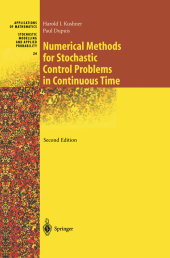 Neuerscheinungen 2013Stand: 2020-01-07 |
Schnellsuche
ISBN/Stichwort/Autor
|
Herderstraße 10
10625 Berlin
Tel.: 030 315 714 16
Fax 030 315 714 14
info@buchspektrum.de |

Paul G. Dupuis, Harold Kushner
(Beteiligte)
Numerical Methods for Stochastic Control Problems in Continuous Time
2. Aufl. 2013. xii, 476 S. 10 Tabellen. 235 mm
Verlag/Jahr: SPRINGER, BERLIN; SPRINGER NEW YORK; SPRINGER 2013
ISBN: 1-461-26531-2 (1461265312)
Neue ISBN: 978-1-461-26531-3 (9781461265313)
Preis und Lieferzeit: Bitte klicken
Stochastic control is a very active area of research. This monograph, written by two leading authorities in the field, has been updated to reflect the latest developments. It covers effective numerical methods for stochastic control problems in continuous time on two levels, that of practice and that of mathematical development. It is broadly accessible for graduate students and researchers.
Review of Continuous Time Models.- Controlled Markov Chains.- Dynamic Programming Equations.- Markov Chain Approximation Method.- The Approximating Markov Chains.- Computational Methods.- The Ergodic Cost Problem.- Heavy Traffic and Singular Control.- Weak Convergence and the Characterization of Processes.- Convergence Proofs.- Convergence Proofs Continued.- Finite Time and Filtering Problems.- Controlled Variance and Jumps.- Problems from the Calculus of Variations: Finite Time Horizon.- Problems from the Calculus of Variations: Infinite Time Horizon.- The Viscosity Solution Approach.
"The second edition of this acclaimed book from Springer-Verlag has the latest theoretical and practical information on solving stochastic control problems. Including proofs and algorithms using diffusion, jump-diffusion, and other process models, the authors help make randomness a little less scary."
Amazon.com Delivers Mathematics and Statistics e-bulletin, July 2001
Stochastic control is a very active area of research and this monograph written by two leading authorities in the field has been updated to reflect the latest developments. It covers effective numerical methods for stochastic control problems in continuous time on two levels, that of practice (algorithms and applications) and that of the mathematical development. It is broadly accessible for graduate students and researchers.


